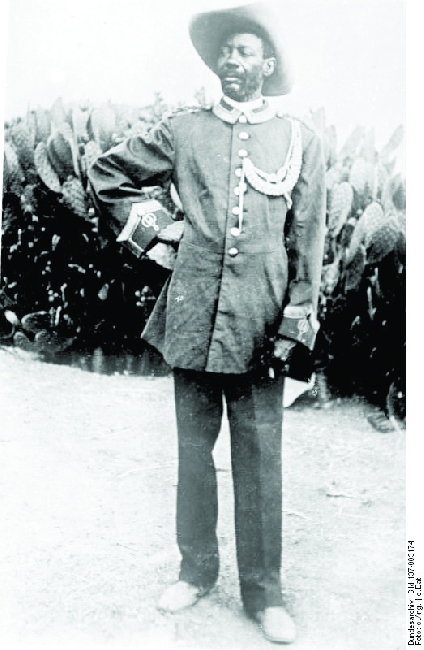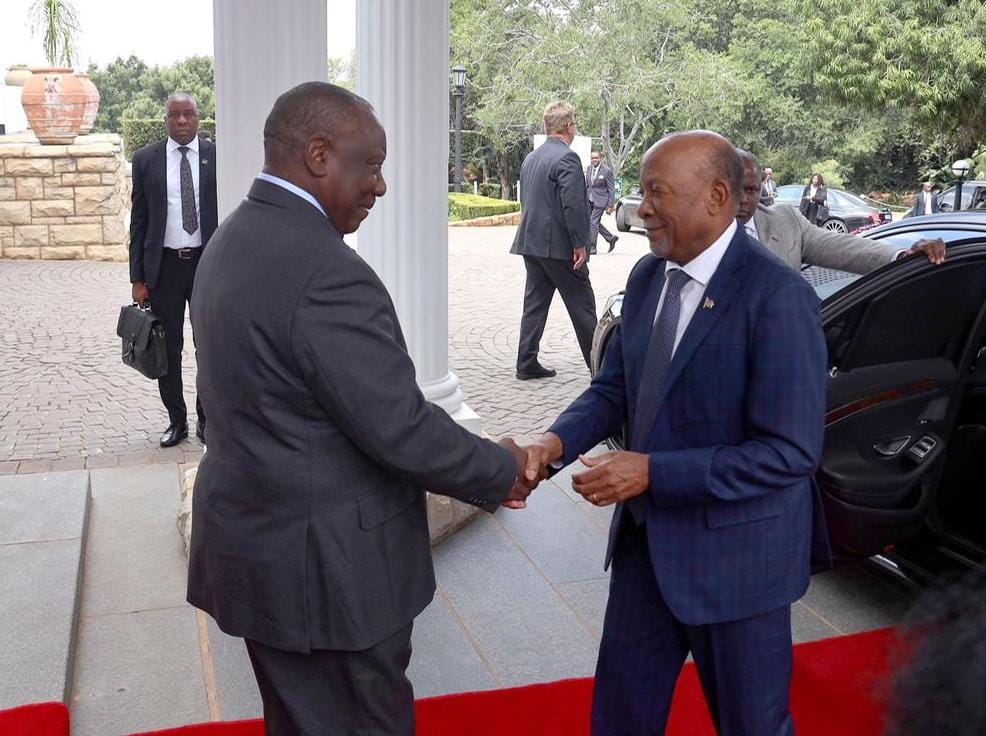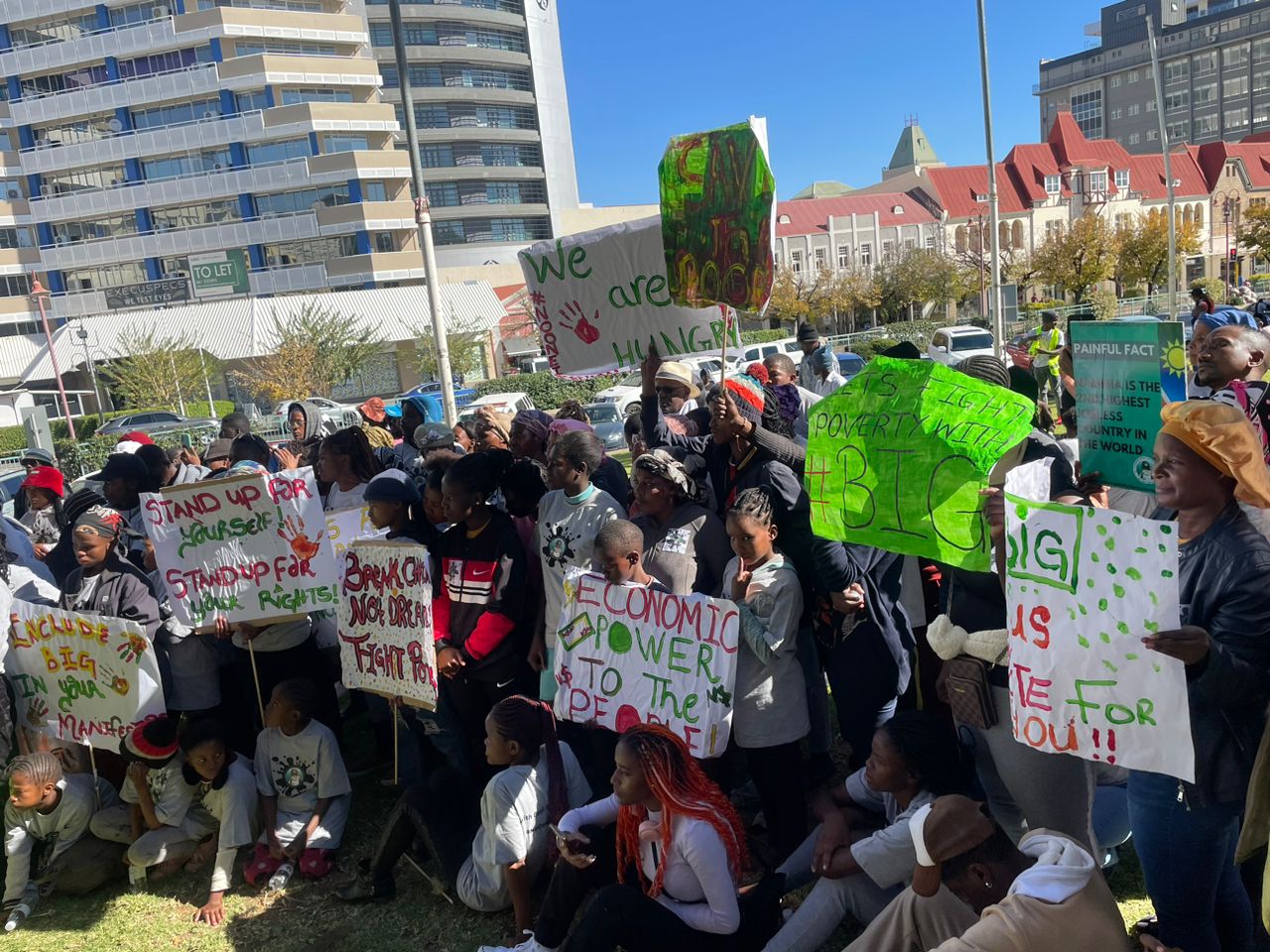Broken and exiled, the great Chief of the Ovaherero, Samuel Maharero solemnly watches the evening sky fade to red as the sun drops slowly over the Botswana desert.
He looks at the crumbling huts spread in front of him and watches his remaining people wander back and forth between fire and home. How did it come to this? How did our great people end up decimated and struggling to survive, far from their homeland? Samuel sinks into his mind and remembers the wars, his youth and the enemy. Memories that he has buried deep away come back to the surface.
His father, Maharero, looms over him and swings him up into the air. Resting on his shoulder he can see blurred faces and figures, rushing about the family home. His father’s voice stirs beneath him and he hears him speaking, deep and loud with authority. War is approaching. It is 1861 and he is only five, but his father is the new chief of the central Hereros. He has moved his people and cattle from Okahandja to Otjimbingwe, disobeying the Afrikaners. Now attack is on the horizon. But safe in his father’s firm grip, he rests easy. This is a war they will win.
He strains hard and remembers his older brother, Wilhelm. Trailing behind, he watches him walk side by side with his powerful father. Wilhelm’s face is hard to recall, so he pictures it young and smiling. As he walks in their wake, he catches pieces of conversation in the wind as they talk and gesture, animated in their discussion. He hangs back, aware that he is not welcome. Wilhelm is being prepared to lead when their father passes and Maharero talks to him differently, like he is a man already.
He remembers the enemy and his initial co-operation. Light skinned men in perfect uniforms walk purposely in his direction. He stands tall besides his ageing father, watching them approach with weary eyes. It is 1888 and he is older and wiser. His brother Wilhelm is now buried deep in the ground, killed during battle. For the past eight years he has been the new hope of the Hereros. Pulled out from the shadows, all eyes are now focused on him.
Awkwardly the greetings are made and stilted translations begin. The Germans produce pieces of paper, scrawled in black ink. “This is a protection treaty, signing will ensure your people’s safety.” He leans towards his father and they speak quickly, quietly. A pen appears and he watches Maharero hold it awkwardly, like a child. He scribbles above the dotted line. The Germans say their farewells and leave, happy they got what they came for.
But what does that dotted line mean? A name written on a piece of paper? Yes, you can stay on our tribal land, but it can never be bought or sold. Those things do not exist. It is our land. Our land.
He remembers responsibility, and calling his men to arms in a war that was long overdue. Lying in front of him is a clean piece of paper. He presses his forehead into the palm of his hand, trying to clear his head. What would his father write? He does not know and Maharero has now passed. For the past 14 years he has been chief and now is the time for action. He picks up his pen and begins “All the headmen in my country…”. It is 1904 and he is urging every Ovaherero chief rise against the Germans.
Across the land there has been tension building for years, attacks have gone unpunished and their land is slowly disappearing. He ends the letter with a final request. “Refrain from touching missionaries, English, Basters, Berg-Damaras, Namas and Boers.” Copied and sealed, the letters are sent. In weeks the men will mobilise and a bloody, sickening war will begin.
Clearly, he remembers the horrors of battle. Fleeing under the cover of night, he leads his men through the mess of bodies. As he walks, he looks at the lifeless figures sprawled in the sand. He steps over friends and family members, careful not to disturb them. Heading to the east, into the dry Kalahari, they walk quickly in fear of being followed by the enemy. The Battle Of Waterberg is over. His people have been defeated and now afraid they will be surrounded, he leads the remaining in retreat. Although he feels sick and empty, he leads from the front. On his head is a bounty for 500 Marks, he is a wanted man.
The sun drops below the horizon and a chill spreads through the air. Samuel comes back to the present, to Botswana, and looks at his people before him who are thin and tired. It was a long walk through the scorching desert with little food and water. Many didn’t make it. When can he take home those who are left? When can he take them back to where they belong? He only hopes it will be soon.
Although his spirit was gone, Samuel did finally return home. After he died on 14 March 1923, his body was transported back to his homeland where he was buried in the Herero Grave complex in Okahandja. In 2002, Sam Nujoma remembered his life during inauguration. “Chief Samuel Maharero… started to make plans for an uprising against the German colonial authorities and white German settlers in the country. As a result, in January 1904 the uprising began… To his revolutionary spirit and his visionary memory, we humbly offer our honour and respect.”
Stay informed with The Namibian – your source for credible journalism. Get in-depth reporting and opinions for
only N$85 a month. Invest in journalism, invest in democracy –
Subscribe Now!






